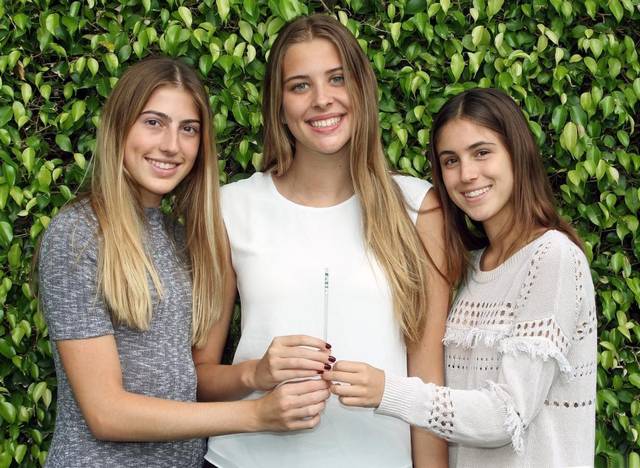By Nancy Dahlberg
The Miami Herald
WWR Article Summary (tl;dr) Meet the three young women who have come up with a unique way to keep other women safe. Their concept which recently won first place in the Miami Herald Business Plan Challenge High School Track, is called “Smart Straws.” The straws detect the most common rape drugs and turn blue when they are placed in nonalcoholic or alcoholic drinks.
The Miami Herald
This winning team faced plenty of naysayers — from their own class.
But Susana Cappello, Carolina Baigorri and Victoria Roca of Gulliver Preparatory were powered by passion. They took the feedback into consideration, changed their product without changing their mission and persisted — all the way to first place in the Business Plan Challenge High School Track.
Their winning concept is Smart Straws, which detect the most common rape drugs and turn blue when they are placed in nonalcoholic or alcoholic drinks.
“We were really passionate about this so we kept on pursuing it,” said Susana, who said classmates referred to them as “the straw ladies.” But it’s a real and growing problem, she said. “Our goal is to reduce the [date rape] statistics.”
The judges liked the simplicity of the concept — one judge called it brilliant — because the straws could be distributed by school organizations and campus health clinics, for example, and students could carry them in their purses.
Acknowledging the product could be easily copied, the judges also liked that the girls were looking into patent protection. They also encouraged the team to think beyond their first product and consider what other related products or services could complement the straws and further the company’s social impact mission.
The use of so-called club drugs to facilitate rape is a decades-old problem that seems to have intensified in recent years, particularly in college towns, as the drugs are easier to obtain. A survey the team conducted at Northwestern University found that 85 percent of respondents said they would use such a straw. Half of them knew someone who had been drugged at a party.
Through research, the students found out that GHB and Ketamine are overwhelmingly the most common club drugs, so they set out to develop a first product that can test for those two; tests for other drugs could be added later, Victoria said. The college-age demographic would be the team’s target market. If the drinks are found to be safe, they can be consumed because the tests would not contaminate the drink, she said.
While drug test kits already exist, the student team had doubts about how widely they are being used by college students.
Initially they considered putting the tests in some form of jewelry. Fellow students didn’t like the idea, so they pivoted to straws that incorporated a test for the drugs. Straws are easy to carry, inexpensive to make and something that bars, sororities, fraternities and other student organizations that host parties could easily stock and hand out. Campus health clinics could also distribute them, along with literature about ways to stay safe. They also want to make the straws eco-friendly.
“Susi, Caro and Toyi discussed and researched issues important to them during the ideation part of their Entrepreneurship class,” said their teacher, Daniela Brenha, of Gulliver’s multi-year International Business and Entrepreneurship Program. “The alarming statistics of women who are sexually assaulted after being drugged by ‘date rape’ drugs compelled them to create Smart Straws. They have designed the straws and are perfecting the formula, and we are very proud of them.”
The team has been consulting with a test kit maker about the manufacturing issues and potentially making the product for them. They want to have more discussions with campus organizations and clinics, and explore the patent process. To fund the venture, the team proposed a crowd-funding campaign.
Regardless of the outcome, it has been a learning experience that they will carry with them. All are interested in pursuing business and entrepreneurship in college.
Victoria, a senior, has been accepted into Babson College and is looking forward to taking her first university course on entrepreneurship. Entrepreneurship is in her blood; her grandfather founded Digitel in Venezuela; her mother also is an entrepreneur. She also helps her cousins as an ambassador for their app business.
Susana, a junior, also comes from entrepreneurial stock. Her father, Juan Pablo Cappello, was one of the founding investors for The LAB Miami and has been involved in numerous ventures as an entrepreneur or investor. She has worked at The LAB, a hub for entrepreneurs, and has developed a business called Sketch Your Home.














































































































































































































































































































































































